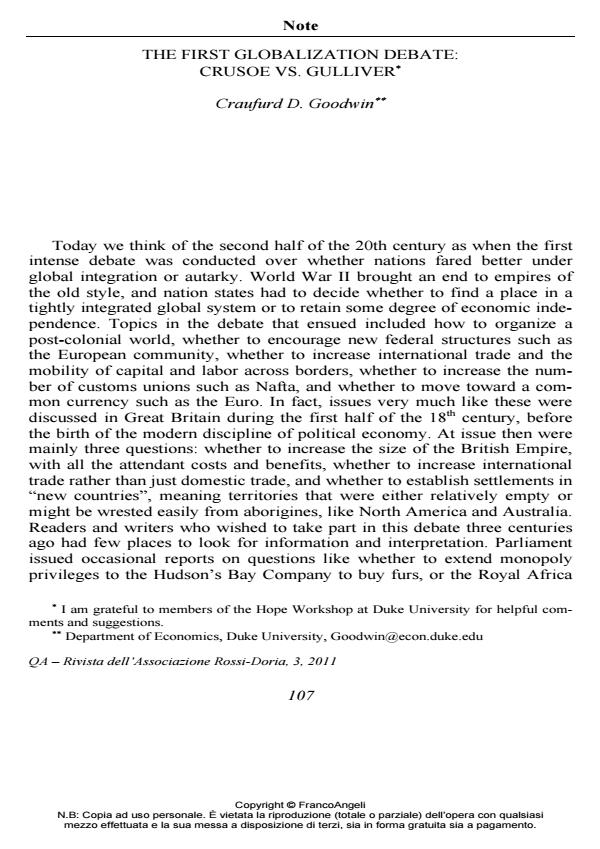The First Globalization Debate: Crusoe vs. Gulliver
Titolo Rivista QA Rivista dell’Associazione Rossi-Doria
Autori/Curatori Craufurd D. Goodwin
Anno di pubblicazione 2011 Fascicolo 2011/3
Lingua Inglese Numero pagine 19 P. 107-125 Dimensione file 290 KB
DOI 10.3280/QU2011-003005
Il DOI è il codice a barre della proprietà intellettuale: per saperne di più
clicca qui
Qui sotto puoi vedere in anteprima la prima pagina di questo articolo.
Se questo articolo ti interessa, lo puoi acquistare (e scaricare in formato pdf) seguendo le facili indicazioni per acquistare il download credit. Acquista Download Credits per scaricare questo Articolo in formato PDF

FrancoAngeli è membro della Publishers International Linking Association, Inc (PILA), associazione indipendente e non profit per facilitare (attraverso i servizi tecnologici implementati da CrossRef.org) l’accesso degli studiosi ai contenuti digitali nelle pubblicazioni professionali e scientifiche.
Two of the earliest novels in English, Robinson Crusoe (1719) by Daniel Defoe and Gulliver’s Travels (1726) by Jonathan Swift, are widely perceived as an entertaining adventure story and a pioneering work of science fiction. Viewed by modern economists, however, they appear as expressions of opposing positions on the desirability of integration within a world economy. Crusoe demonstrated the gains from trade and colonization and the attendant social and political benefits. By contrast, Swift warned of complex entanglements that would arise from globalization, especially with foreign leaders who operated from theory and models rather than common sense.
Due fra i primi romanzi della letteratura inglese, Robinson Crusoe (1719) di Daniel Defoe e I Viaggi di Gulliver (1726) di Jonathan Swift, sono generalmente considerati come un racconto avvincente di avventura, il primo, e un’opera che precorre la fantascienza il secondo. Dal punto di vista degli economisti moderni, comunque, essi esprimono due posizioni opposte sulla convenienza di un’integrazione economica mondiale. Crusoe dimostrò i vantaggi del commercio internazionale e della colonizzazione, e dei benefici sociali e politici che ne derivano. Swift, invece, metteva in guardia contro le complesse situazioni ingarbugliate derivanti dalla globalizzazione, soprattutto con governanti stranieri che operavano in base a teorie e modelli invece di seguire il senso comune.
Parole chiave:Daniel Defoe, Jonathan Swift, Robinson Crusoe, I viaggi di Gulliver, Globalizzazione, Commercio internazionale
Jel codes:B110, B310, F020
- The Use (and Abuse) of Robinson Crusoe in Neoclassical Economics Fritz Söllner, in History of Political Economy /2016 pp.35
DOI: 10.1215/00182702-3452291
Craufurd D. Goodwin, The First Globalization Debate: Crusoe vs. Gulliver in "QA Rivista dell’Associazione Rossi-Doria" 3/2011, pp 107-125, DOI: 10.3280/QU2011-003005